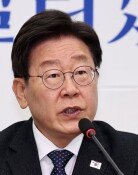The coronavirus pandemic hits the global financial market
The coronavirus pandemic hits the global financial market
Posted March. 11, 2020 07:53,
Updated March. 11, 2020 07:53
As COVID-19 has spread to North America and Europe, the World Health Organization declared pandemic risks have been materializing. In the meantime, economic risks caused by the novel coronavirus are also growing due to the concerns over the pandemic and falling oil prices. On Monday, the S&P 500 index went down by more than 7 percent while the Dow Jones Industrial Average declined by more than 2,000 points in the U.S. stock market. It appears that the financial market will remain unstable for some time even though South Korea’s KOSPI and KOSDAQ rebounded on Tuesday.
Signs of “a global oil war” are adding stress to the stock market. Global oil prices crashed by 30 percent after OPEC and non-OPEC countries failed to agree on production reduction. The failure has prompted the beginning of the chicken game among Saudi Arabia, Russia and U.S. shale gas providers, which is increasing concerns over “reverse oil shock” where oil prices plunge.
In the case of SARS and MERS, the economy was put quickly back on track when the diseases were contained. But experts say this might not be the case for COVID-19. In the U.S. stock market, many say that the stock market boom, which lasted for the past 11 years, is practically over and no one knows when the downturn will end. There is not much the United States and Europe can do to drive down interest rates because they have already used quantitative easing and negative interest rates to inject money into the market. China has led the growth of the global economy since 2008, but its economy has also slowed down. The circumstances both at home and abroad are worse than those of 2008.
To allay concerns over crashing stock prices, the South Korean government announced Tuesday its plan to expand a ban on short stock selling and extend the period. The government should work closely together with the Bank of Korea to monitor the trends in the financial and foreign exchange markets and introduce timely measures that can help stabilize them. It also has to keep a close eye on the real economy so that financial difficulties of businesses that are struggling with both supply and demand will not spill over to the financial market. President Moon Jae-in ordered negotiating with countries that have placed an entry ban on South Koreans to make an exception for businesses. “Economic risk containment” should be a priority even when we are battling against the virus.







